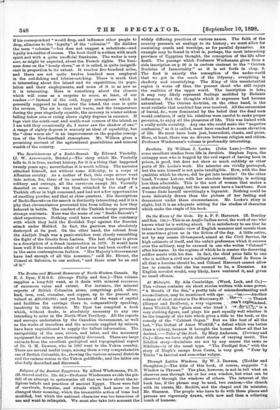Religion of the Ancient Egyptians. By Alfred Wiedemann, Ph.D. (H.
Grevel and Co. 12s. 6d.)—Professor Wiedemann avoids the pit- fall of an attempt to systematise all that we know about the re- ligious beliefs and practices of ancient Egypt. These were full of survivals, formulas, and rituals which had more or less changed their meaning, which the irresistible action of time had modified, but which the national character was too tenacious of use and wont to relinquish. We must also take into account the widely differing practices of various names. The faith of the country presents an analogy to its history ; we must allow for coexisting creeds and worships, as for parallel dynasties. An example may be found in what is, perhaps, the most interesting province of Egyptian thought, the conception of the life after death. The passage which Professor Wiedemann gives from a stela inscription on p. 96 is in curious contrast to the " Osirian Doctrine of Immortality" as it is set forth in chap. 9.. The first is exactly the conception of the under-world that we get in the vercuta of the Odyssey; everything is shadowy and unsatisfying. The King of this unsubstantial region is worse off than the poorest churl who still enjoys the realities of the upper world. The inscription is late; it may very likely represent feelings modified by Hellenic influences. But the thoughts which it expresses had become naturalised. The Osirian doctrine, on the other hand, is the. most realistic that mankind has ever received. All the ceremonies of burial, &c., were dominated by the belief that the dead man would continue, if only his relatives were careful to make proper provision, to enjoy all the pleasures of life. This was linked with a really noble morality. Any one who could make the "negative confession," as it is called, must have reached no mean elevation of life. He must have been just, benevolent, chaste, and pious. Here, at least, there was no divorce between religion and ethics. Professor Wiedemann's volume is profoundly interesting.


































 Previous page
Previous page